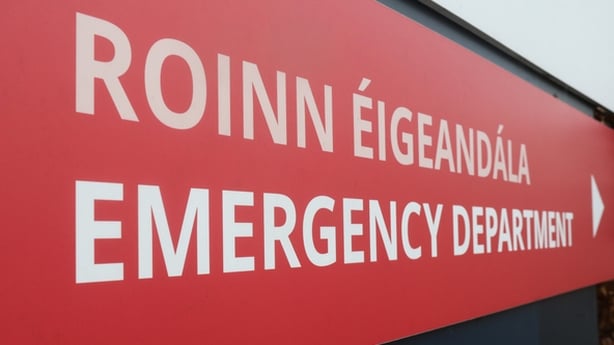Flu vaccination take-up among healthcare workers is just 30% this winter, according to figures from the Health Service Executive.
The figure is far below the HSE's target rate of 75% for staff in the sector.
The Irish Medical Organisation said that the importance of flu vaccination for both the public and health staff needs to be reinforced.
IMO President Dr Denis McCauley said the vaccine uptake this year in the over 65s was good, but the whole issue of vaccination in Ireland has to be re-set after Covid-19 due to what he described as misinformation.
Latest figures show flu cases reducing but still at high levels, with over 3,600 confirmed cases last week.
A downward trend in the uptake of the vaccine among healthcare workers has been observed for several years.
We need your consent to load this rte-player contentWe use rte-player to manage extra content that can set cookies on your device and collect data about your activity. Please review their details and accept them to load the content.Manage Preferences
According to data from the Health Protection Surveillance Centre (HPSC), the take-up rate among hospital-based staff fell from 70% in the 2020/21 season to 50.3% in the 2023/24 season.
The decline is also marked in healthcare workers who work in long-term care facilities, such as nursing homes, falling from 63.3% in 2020/21 to 42.8% last winter.
There are also regional disparities within the data.
The take-up rate among workers last year was highest in the HSE Dublin and South-East region - at 56.6% - while it was just below 40% in the HSE West and North West area.
The National Immunisation Advisory Commission recommends that several different groups avail of the flu vaccine including healthcare workers, those aged 60 and older and between two and 17, and pregnant women.
More than one million doses were administered between 2 September 2024 and 5 January 2025.
The take-up rate varies between groups with just 19.1% of 2-17 year olds being vaccinated. This compares with 64% of those aged 60 and over.
For HSE healthcare workers, however, the take-up rate was just 30%.
Healthcare workers 'important group' for vaccination - Mills
Professor of Experimental Immunology at Trinity College Dublin Kingston Mills said it was vital that healthcare workers are vaccinated against flu.
They are "high risk because they're more exposed to individuals that have influenza," he said.
"There are a lot of people in hospital with influenza, and, of course, if the healthcare workers get infected and if they're stay in work, they're likely to infect others.
"It's a very important group that need to get vaccinated with the healthcare workers."
Prof Mills said that even though a healthcare worker may get a less severe form of flu than an older person or someone who is immunocompromised, their higher risk of infection means it is important that they are immunised.

The latest figures show that while the number of flu cases is reducing, it is still at a high level, with 3,624 confirmed cases in the week to last Saturday.
There were 801 hospitalisations due to flu last week, with six deaths also reported.
There have been 14,657 cases reported so far this winter season.
The strain of the virus this year - the AH1 variant - has not been dominant since the 2018/19 season.
Cases of Covid-19 and the Respiratory Syncytial Virus (RSV) are also reducing. There were 180 confirmed Covid cases last week with 57 people hospitalised, and 575 RSV cases with 183 patients hospitalised.
Flu puts a strain on emergency departments and many hospitals do not schedule non-time critical procedures around the Christmas period because of the expected surge in cases.
"The instance of influenza was much lower during the Covid-19 pandemic, mainly because people were isolating and there wasn't much contact, so there was less spread of most respiratory pathogens. including influenza," Prof Mills said.
"The virus mutates each year and some of the variants in different years are more severe than others and one of the variants we have now causes quite severe influenza.
"So, I think it's even more important than ever to get vaccines," he said.
Additional reporting Fergal Bowers







